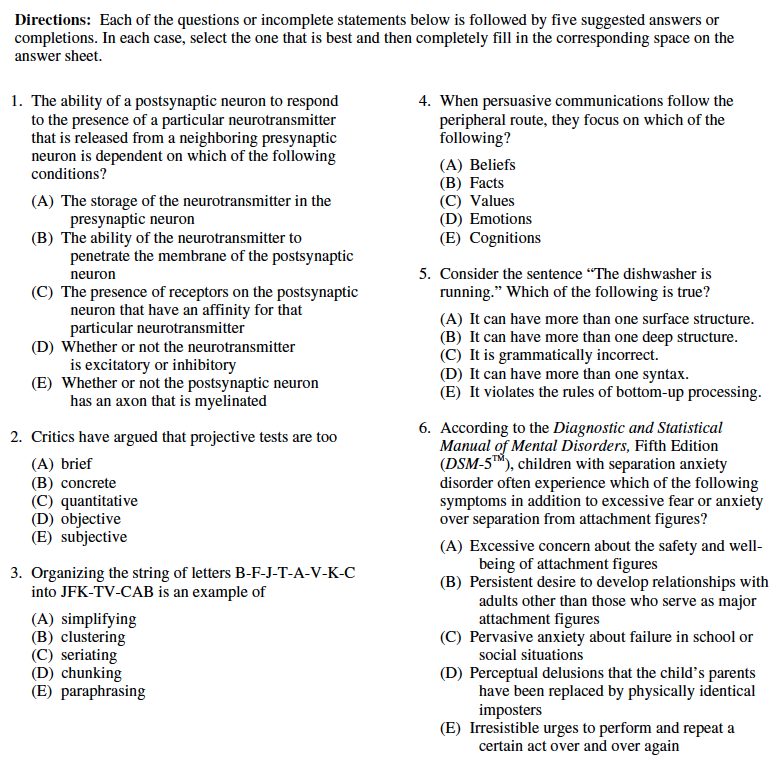 Understanding the GRE Psychology Subject Test with Practice Questions
Understanding the GRE Psychology Subject Test with Practice Questions
After graduating with a bachelor’s degree, you may think of a career in psychology, and joining a graduate program will be the logical step to take. However, besides transcripts, letters of recommendation, and essays, some graduate schools require students to submit Graduate Record Examination scores.
You can take the GRE General Test or the GRE Psychology Subject Test, and depending on the institution, and you might be required to submit either or both. If you can manage, it’s ideal for taking both tests. This will put you in a position to qualify for most potential schools.
Here is a guide to the GRE Psychology subject test along with helpful tips and strategies to help you ace your GRE test.
What is the GRE Psychology Subject Test?
The GRE Psychology test is part of the graduate school admission standardized exams that students must fulfill to receive admission. Although the test is a single–subject optional test in the GRE, candidates considering taking psychology courses in graduate school should consider the exam.
However, the topic test is not required for all psychology programs. Some programs encourage applicants to take the psychological subject test, while others require acceptance.
The test comprises around 205 multiple-choice questions covering material learned in undergraduate psychology classes and lasts several hours. You will be tested in six subject areas, and for each, you receive a subscore. The number of questions you will get right on a 200-990 scale determines the overall score for the test.
Notably, the correct answer for each section gets a point on a 20-99 scale for the subscore.
What’s on the GRE Psychology Test?
What Topics are Covered and Skills are tested?
Skills tested include undergraduate level psychology, learning, language, thinking, memory, sensation and perception, lifespan development, behavioral and physiological neuroscience, personality, social and other areas.
The psychology test covers six broad subject skill areas listed below.
- Biological skills: 17 – 21%
- Cognitive skills: 17 – 24%
- Developmental skills: 12 – 14%
- Clinical skills: 15 – 19%
- Methodology and measurement skills: 15 – 19%
Biological skills account for 17-21% of the test and cover topics such as sensation and perception. The cognitive part covers 17-24% of the test and covers areas such as memory and learning, while the social section covers 12-14% of the test with topics such a motivation and behavior.
Developmental and clinical aspects will cover 12-14% and 15-19%, respectively, with topics such as language, abnormal psychology, and personality. The last category is methodology and measurement, which covers 15-19% of the test in topics such as research designs and statistics.
Many test takers think this is a challenging test, but it doesn’t have to be if you practice enough.
GRE Psychology Practice Test Questions
Here are several GRE psychology practice test questions that you can use to quiz your knowledge of the subjects that appear on the GRE test.

GRE Psychology Subject Exam Format & Structure
The GRE Psychology exam comprises 205 multiple choice questions, and each question has five different answer choices. The candidate should pick the answer which best answers the question.
The GRE Psychology test lasts two hours and fifty minutes. Most editions of the test use diagnostic criteria, classifications, and terminologies used in the newest Diagnostic and Statistical Manual of Mental Disorders, DSM-5 version. Tables, graphs, and other material can be used in the test, sometimes as the foundation for several questions.
Interestingly you will use the knowledge acquired in undergraduate psychology courses to answer questions on the test. Although there are six categories of topics that the test covers, questions from these categories are neither labeled nor designated. Instead, questions from different sections will be distributed randomly throughout the test.
How is the GRE Psychology Subject Graded & Scored?
Grading the GRE psychology test requires you to answer questions correctly, and the number of questions you get correctly will be converted by a total score converted into a scaled score. A total scaled score is calculated using the number of questions correctly answered. Incorrect or unanswered questions are not deducted from the score and have no bearing on it.
Since questions belonging to a particular area require ability in other content areas, the total score is used to ensure that your responses in other areas contribute to your subscore. Once computation of a subscore is complete, it is then converted into a scaled subscore to ensure your GRE Psychology test score is comparable to scaled scores of other editions.
As a result, the equal scaled score on a specific test will indicate the same levels irrespective of the edition when you took the test.
What is a Good GRE Psychology Score?
Are all GRE Psychology Questions Graded?
All questions are graded, and you get a raw score for each correct answer. Although incorrect answers are counted incorrect, they are not subtracted from the total score. The score ranges between 200 and 880, but most of the test takers’ scores range from 440 to 760, and the 50th percentile falls around 615. The average psychology test score is 577 at the postgraduate level and around 633 at the doctoral level.
Although a good score will depend on graduate school, if your score falls in the 75th percentile, it is a good score. A good score will get you into your graduate program of choice, and despite this counting as good, it depends on the program.
When is the GRE Psychology Subject Test Offered?
The GRE Psychology Test is meant for students with a bachelor’s degree in psychology or a related field looking to enter psychology graduate programs. The test assesses the student’s competence in psychology to help graduate admission committees gauge the student’s proficiency.
Should I take the Psychology Subject Test?
You should take your GRE when you are in the third year of your undergraduate degree. According to experts, students should take the test a year before applying for a graduate program because the score is only valid for five years.
However, suppose you take the test electronically. In that case, it only takes around 10-15 days before you can receive your score, so no taking it a year before applying for the graduate program is ideal.
What can You Bring to the GRE Psychology Exam?
During the test day, you should have a valid photo ID such as a driver’s license to verify your identity and a confirmation voucher/mail from ETS with information in the testing center, time, and date.
GRE Psychology Exam Cost & Fees
In general, GRE costs around $205 in the US, Puerto Rico, and other US territories. On the other hand, the international test can cost up to $255.
It’s vital to note that there are separate fees for rescheduling, standby testing, changing tests center and later registration.

